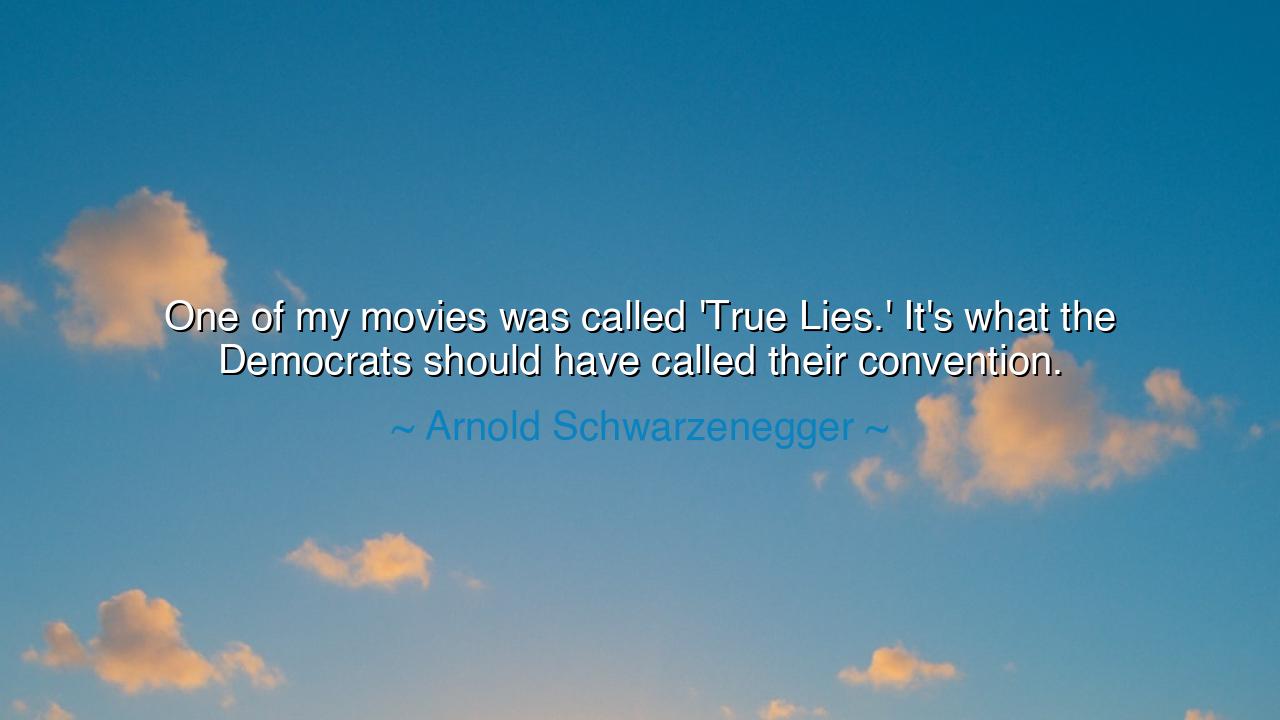
One of my movies was called 'True Lies.' It's what the Democrats
One of my movies was called 'True Lies.' It's what the Democrats should have called their convention.






Hear, O children of rhetoric and power, the words of Arnold Schwarzenegger, who once declared: “One of my movies was called True Lies. It’s what the Democrats should have called their convention.” With this phrase, he wields the sword of satire, sharpening his political critique with the edge of his cinematic past. In jest and in challenge, he points to the tension between truth and deception, and to the ever-shifting ground upon which politics is staged. His words remind us that even the grandest gatherings of leaders can be cloaked not in truth, but in performance.
The meaning is thus: Schwarzenegger draws upon his film True Lies, a tale of secrets and deception, to liken political speeches and conventions to performances filled with contradictions—words that claim to be truth yet conceal falsehoods. In his jest, there lies a serious charge: that politics often thrives on appearances, on carefully crafted images that may obscure reality. By invoking his movie’s title, he unmasks this paradox, showing how truth itself can be twisted into a weapon of illusion.
The ancients too understood the danger of true lies. Consider the tale of the Trojan Horse, brought as a gift of peace, but hiding soldiers within. To the Trojans it seemed a sign of victory, yet it carried destruction in its belly. So too does Schwarzenegger’s metaphor warn: that what appears as noble words of unity and hope may carry within them the hidden armies of self-interest, calculation, and deceit. In politics, as in war, the greatest danger is not the open enemy, but the false promise wrapped in beauty.
History gives us also the example of Richard Nixon, who spoke of integrity and leadership while the hidden scandal of Watergate unraveled his power. His words, polished and presidential, were revealed to be true lies—statements cloaked in sincerity, yet emptied of truth. In this way, Schwarzenegger’s remark connects to a broader history: the warning that political life is too often shaped by rhetoric designed not to enlighten but to persuade, not to reveal but to conceal.
At the heart of this jest lies a deeper truth about human nature. For men and women alike are drawn to the stories that leaders tell, even when those stories bend truth. It is easier to be comforted by true lies than to be unsettled by harsh truths. Yet societies that feast on lies, however pleasant, are destined to crumble, for their foundations are weak. Only truth, however difficult, can sustain a people through trials and storms.
The lesson, then, is clear: do not be deceived by appearances. Whether in politics, in art, or in life, seek to pierce the veil of performance and see what lies beneath. Listen not only to words, but to deeds. Judge not only by promises, but by actions. For the mark of wisdom is the ability to discern truth amid the clamor of persuasion. Schwarzenegger’s sharp jest is not only a mockery of a party, but a reminder to all: beware the stagecraft of politics, for it is as much theater as it is governance.
What, then, should you do? Train your eyes to see beyond slogans, and your ears to hear beyond applause. Study history, that you may recognize the patterns of deception. Question those who lead you, not with cynicism alone, but with courage and discernment. And above all, cultivate within yourself a loyalty to truth, even when it is hard. For if you learn to see clearly, no true lie will ensnare you, and no false promise will rule your soul.
Thus let these words echo: “It’s what they should have called their convention.” Though spoken in jest, they carry the weight of warning. For politics, like cinema, is filled with spectacle. But the wise know that beneath the glitter lies either truth or falsehood—and only those who discern between the two shall walk the path of freedom.






AAdministratorAdministrator
Welcome, honored guests. Please leave a comment, we will respond soon